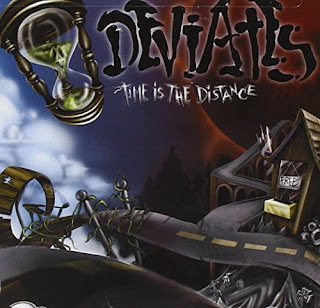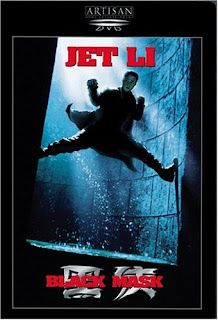V1.8
Mainstream music pundits have all but declared that the punk genre has assumed room temperature. A spin or two of Time Is the Distance (Epitaph), the sophomore album by Bay area punk prodigies Deviates, proves that misconception to be dead wrong. Punk rock is alive and well, still raging against the machine with three chords and a bad attitude. Deviates kick out the jams with a little more intelligence than many punk wunderkinds, the band’s Time Is the Distance a youthful cross between Pennywise and Bad Religion, with a measure of Black Flag thrown in. Roaring six-string work dominates the songs on Time Is The Distance, guitarist Charley’s fingers ripping and tearing at the frets like a lion feasting on its prey. Deviates frontman Brian propels songs like the anthemic “No Mistake” with explosive vocals, the album’s socially conscious lyrics are matched by relentless rhythms. Barely out of their teens, Deviates bring a great deal of energy and vigor to Time Is The Distance, proving that, as punk godfather Peter Townsend once said, “the kids are alright!”
Whether you love ‘em or hate ‘em, anyone coming of age during the seventies remembers the Electric Light Orchestra. An attempt by singer/songwriter Jeff Lynne to fuse Beatlesque pop tunes with symphonic overtones, ELO (as they were known) chalked up a number of big hits during the decade. It all began with 1974’s Eldorado (Epic/Legacy), a conceptual masterpiece that yielded the British band’s first U.S. top ten hit in the infectious “Can’t Get It Out of My Head.” Recently reissued with original artwork and bonus tracks, Eldorado matches priceless melodies and multi-layered instrumentation to create a sound as ambitious as the Beatles’ Sgt. Pepper’s album. Whereas pretentious progressive rock bands were masquerading as classical composers at the time, Lynne effortlessly incorporated strings and orchestra into his fantasy song cycle, Eldorado standing as ELO’s finest moment. On the heels of the recently released Zoom, the first real ELO album in 15 years, Legacy has also reissued deluxe editions of ELO’s Discovery (1979), Time (1981), and Secret Messages (1983).
The recent attempts by so-called liberals such as Joe Leiberman and Hilary Clinton to use the power of Congress to reign in unruly record labels, game developers and movie studios is just one chapter in an ongoing struggle between creators and would-be censors. With his book Parental Advisory (Perennial/Harper Collins), author and music fan Eric Nuzum does an excellent job in presenting the history of music censorship in the United States. Nuzum discusses the major targets of the censor (album artwork, lyrical concerns, musician lifestyles, music videos, etc.) as well as religious opposition to music and attempts by lawmakers to censor with ill-conceived legislation. A timeline of music censorship traces the phenomena from the Civil War era to the modern day while an extensive biography provides areas for future reading. Nuzum is an intelligent and entertaining writer who has done his homework, delivering in Parental Advisory a sordid history of opposition to popular culture. If the price of freedom is eternal vigilance, Eric Nuzum will open your eyes to this important issue.
Although Jet Li has enjoyed modest box office successes like this summer’s Kiss of the Dragon, he’s still waiting for that one breakthrough film to catapult him to the top. Overlooked in theatrical release, action junkies craving cheap thrills should look no further than the Hong Kong production Black Mask (New Line Home Video), dubbed for DVD. The perfect replacement for aging celluloid heroes like Arnie, Steven and Chuck, Li plays Simon, a mild-mannered librarian who holds a dangerous secret – he is actually a genetically engineered super soldier who escaped from a secret government program to find a new life. When his fellow former military mutants make a grab for power by knocking off Hong Kong’s druglords in the most violent and bloody manner imaginable, Simon’s quiet life comes unraveled. The librarian becomes the “Black Mask,” a mysterious superhero forced to combat his former Commander and fellow soldiers.
Li’s fight scenes with his former playmates are nothing short of astonishing, the actor making full use of a lifetime of martial arts training. With advanced wirework choreographed by the same genius that later created amazing fight scenes in The Matrix and Crouching Tiger, Hidden Dragon, Jet Li comes across as a supernatural-fighting machine. As legendary drive-in movie critic Joe Bob Briggs would say, Black Mask has no plot to get in the way of the action. You will find kung fu, laser fu, motorcycle fu and the dreaded poison gas fu. As with many Hong Kong action flicks, there’s a bloody hospital shoot-out, and heads and hands do roll. Kudos to Jet Li for the best Bruce Lee imitation ever. Special recognition is also deserved by the dangerously beautiful Francoise Yip, who plays Simon’s former love, Karen Mok for comic relief and to Patrick Lung Kang as the exceptional head villain, who looks like an Asian Joey Ramone. Give Black Mask four stars – the Rev sez “check it out!” (View From The Hill, July 2001)



No comments:
Post a Comment